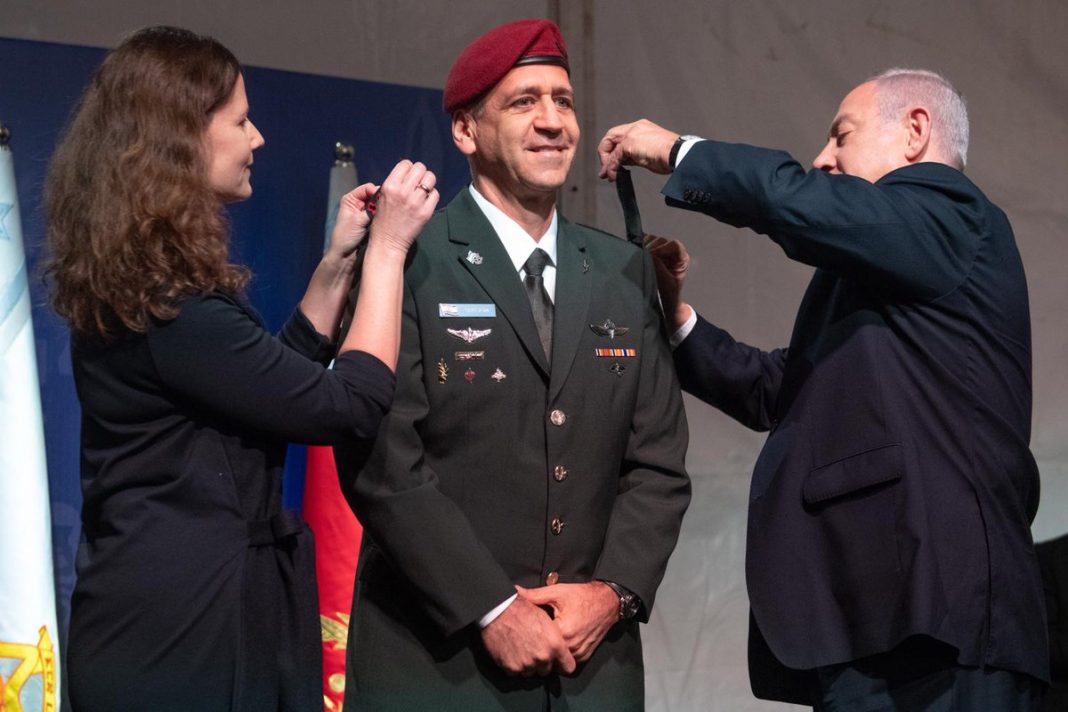New Israeli Military Chief Aviv Kochavi Vows to Make IDF ‘Deadly, Efficient Army’
تقرير من الهآرتس: رئيس الأركان الإسرائيلي الجديد افيف كوخافي يتعهد بجعل جيش بلاده جيشًا قاتلاً وفعالاً
Yaniv Kubovich/Haaretz/January 15/19
Kochavi replaces Lt. Gen. Gadi Eisenkot, who says he leaves behind ‘a fit, prepared and powerful military’ ■ Netanyahu welcomes head of army, says he’s ‘not looking for unnecessary wars’
Kochavi was promoted from deputy chief of staff by Prime Minister Benjamin Netanyahu in a ceremony at the Israeli army headquarters in Tel Aviv, also attended by Eisenkot.
Kochavi, born in 1964, grew up in Kiryat Bialik in northern Israel. Kochavi studied Philosophy at the Hebrew University in Jerusalem, Public Administration at Harvard and International Relations at Johns Hopkins. He’s the first vegetarian chief of staff.
“I take this job upon myself in sacred reverence, I take it as an honor,” said Kochavi.”It is an honor received with the help of others who are deserving of gratitude. To my parents who gave me my first compass, a moral compass.”
“Soldiers and officers, the IDF is my second home,” he said. “I love the organization and its soldiers. I intend to act together with the General Staff, in cooperation with all the levels of the organization, from a deep understanding of the strength of the people within it. Each soldier is a valuable asset that we have been entrusted with, and it is our duty to care for our charges. Similarly, we are responsible for the memory of the fallen, the support of grieving families, the wounded and the return of the missing.”
“Now, as it is my turn, and I have received the responsibility of leading the army, I commit to dedicating all my energy, with a critical and demanding approach, to strengthening our defensive wall, to training for present and future threats – which focuses upon strengthening our attack capabilities towards our enemies, and presenting an army that is deadly, efficient and modern, that preserves its mission and it’s uniqueness,” added the incoming chief of staff.
“Like every soldier who enlists, I also vow to dedicate all my efforts to the defense of the homeland. Now as chief of general staff, when in front of me are the foundations of the national security and the good of the nation, I swear it anew. To the general staff, good luck to us all.”
Netanyahu, who addressed the crowds at Kochavi’s welcome ceremony, spoke about Israel’s struggle to keep Iran from attaining nuclear weapons. “We must poke holes in Iran’s lies. We made that apparent with the revelation of Israel’s secret nuclear archive. We did it by destroying the attempted preparations of Hezbollah. I advise them to leave [Syria] quickly, because we will continue with our assertive policy, as promised, without fear and without a break. All of our efforts at building our power in the past few years are aimed at making sure that the army is ready for a single goal – victory in war. And the stronger we are, the better our chances are at peace.”
“I am not looking for excessive wars, yet in necessary wars we will be asked to show true sacrifice,” added Netanyahu.
“I will repeat, in conclusion, what I said here two days ago (at Eisenkot’s goodbye ceremony): If we defend our nation with all our strength, then it will be unnecessary to set out on a full campaign. And if it is necessary – the Israeli army will rise to the challenge. The citizens of Israel will rise to the challenge, unified and united in the face of it, and together we will assure Israel’s continuation and victory.”
Departing Chief of Staff Gadi Eisenkot also made an address in which he spoke about the Israeli military’s preparedness for war in light of criticism sounded by IDF ombudsman Yitzhak Brik.
“During my service I saw it as a duty to fill out many tasks and to make every effort to return my soldiers home safely. Out of this responsbility I placed my goals as chief of staff and in light of this, I am looking at the army I leave behind me and see that it is a fit, prepared and powerful military that has grown stronger in wisdom and determination, an army that initiated and struck on four different arenas and has proved that victory is a sigificant value.”
Eisenkot went on to say that the accomplishments of the IDF were achieved “not with arrogant words but with modesty, deep thought, meticulous planning and professional execution while always casting doubtand aiming to improve. Defense actions cannot always be summed up in an eight-word headline in a newspaper.”
Kochavi was also welcomed by Shin Bet security service chief Nadav Argaman. “I know Aviv for many years. We have collaborated and I think he will be a great chief of staff. We know from the time he served as the head of the Intelligence Corps and as the commander of the Gaza Division. He’s a very talented man,” Argaman said.
Eisenkot and Kochavi, visited the gravesites at Mount Herzl of Israeli soldiers and officers who fell in battle. This is a new tradition honoring the exchange of power within the Israeli army.
During the visit they laid a wreath of flowers and lit a candle in memory of the troops who fell in defense of the homeland. Eisenkot and Kochavi, saluted their friends, officers and soldiers under their command, who had fallen in defense of the nation over their years over service.
Following the visit, they continued on to the Western Wall and received a blessing from the head of the Military Rabbinate of the IDF, Brig. Gen. Eyal Karim, and put notes into the crevices of the wall.
Kochavi will visit later on Tuesday the Yad Vashem Holocaust museum in Jerusalem. He will also dine with Israeli President Reuven Rivlin at his residence. Later in the afternoon he is slated to be officially received by the military’s honorary guard.






















